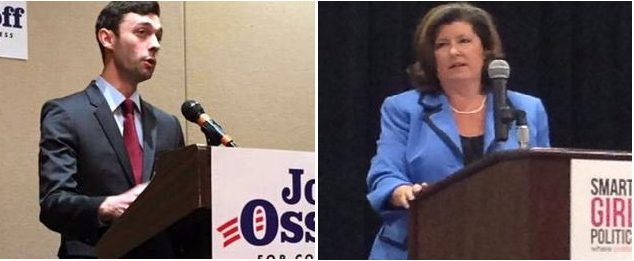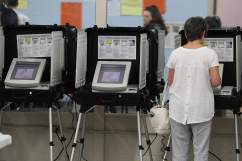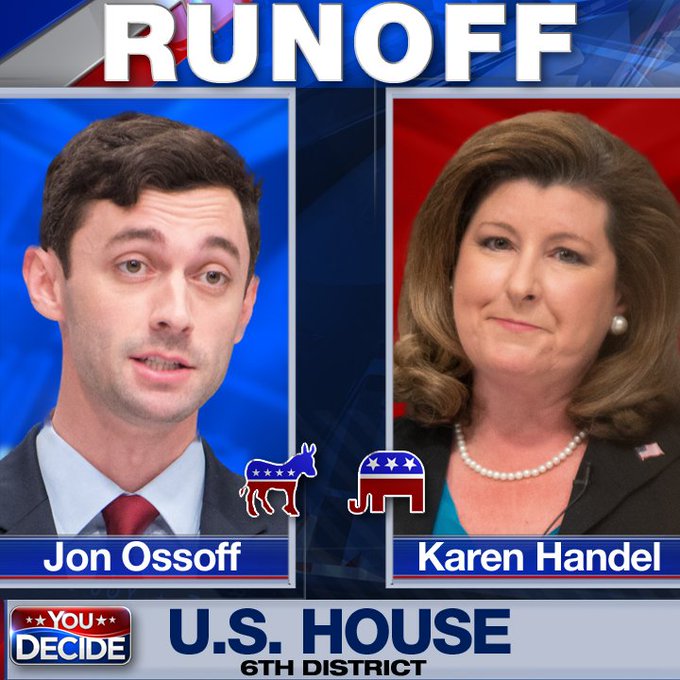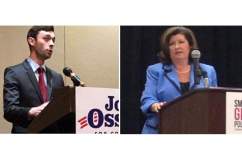
Democrat Jon Ossoff, left, and Republican Karen Handel are likely to face off in a runoff election in Georgia’s 6th district June 20. (Twitter)
A hotly contested election in Georgia’s 6th congressional district is heading toward a runoff.
The race to fill the void in the U.S. House of Representatives left by Tom Price, who was tabbed by President Donald Trump to be the secretary of the Department of Health and Human Services, will feature Democratic newcomer Jon Ossoff against Republican Karen Handel.
None of the 18 candidates in the April 18 special election reached the 50 percent threshold, which sets up the runoff against the top-two candidates: Ossoff and Handel.
Ossoff finished first among all candidates in the first round of the special election (48.10 percent) with Handel taking second (19.78 percent).
Click here for full unofficial results from the April 18 election.
The runoff is slated for June 20, which means there are two more months of intense campaigning before voters will head to the booths yet again to find Price’s replacement.
That means the congressional race, which had already garnered a massive amount of money — and attention — from outside sources, will only escalate until then.
District Race Garnering National Attention
The race had received national attention because it’s the first major election since Trump was elected president. Some have seen it as a referendum on his administration’s policies.
The district covers many parts of the northern Atlanta suburbs and has leaned red for over 50 years. The last Democrat to be elected to the seat was John J. Flynt in 1965, so the margin that Ossoff won by in the first round within the crowded field was surprising, and the fact that a rookie politician is on the cusp of being elected to the seat has propelled the race into the spotlight even further.
Trump took notice of the race throughout the last week of campaigning, with a robocall being recorded and sent to voters in the district April 18. He followed that up with several tweets explaining his take on the election, calling the Georgia 6 election moving toward a runoff a “win” for the GOP.
With 16 candidates exiting the field — including 10 Republicans — Ossoff’s margin of victory will be decreased drastically against Handel to virtually a toss-up, FiveThirtyEight’s Nate Silver predicted.
Early Polling Suggests a Very Tight Runoff Race
A poll released March 27 offered some initial perspective on what would happen if the race headed toward a runoff. It found a large percentage of undecided voters and an extremely tight race between Ossoff and Handel.
Ossoff garnered 42.4 percent support in the poll while Handel was close behind with 41 percent. Among those likely voters, 16.6 percent of them were undecided.
As is the case with most special elections, voter turnout will certainly sway the race. Ossoff placed an added emphasis on getting the younger demographic in the district out the their polling location during the first round — the makeup of the district includes many college students and graduates. That may have to be the case in order for him to get past Handel in the runoff.
Fundraising In the District At an All-Time High
With the field being whittled down to just two candidates, the incredible amount of money already being poured into the first round of the election will only grow, and it figures to do so by a lot.
On April 6, the Ossoff campaign reported a record $8.3 million in funding with $2.1 million on hand for the last few days of campaigning. That was easily the most-ever in the district and the most nationally since Democrat Randy Perkins put up $9 million of his own money in a 2016 congressional race in Florida.
Ossoff’s stockpile of cash came from all parts of the nation — 95 percent was from outside of Georgia. That included over $1 million that was raised by liberal website the Daily Kos.
Handel reported a smaller amount of funds — $463,000 — and had far less money on hand with $183,000 being reported. But outside groups have helped carry the load and attempted to give a competitive advantage to their candidate.
Speaker of the House Paul Ryan‘s Congressional Leadership Fund has provided $2.1 million in ads while the GOP’s National Congressional Campaign Committee chipped in another $1.8 million for the race.
Handel was the beneficiary of $700,000 in ad spending from Ending Spending, a super PAC founded by the Ricketts family.


